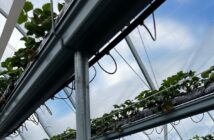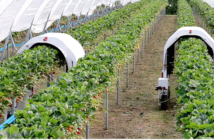Certis’ fungicide product, Karma (potassium hydrogen carbonate), has been granted an ‘Extension of Authorisation for Minor Use’ (EAMU) to allow applications to be made on protected and outdoor strawberries.
Dennis Wilson, an independent consultant, explains the importance of this development for the soft fruit industry. “Strawberries are the most important home-grown fruit crop, representing almost 50% of the value of all UK grown fruit output,” he says. “However, most of the currently favoured strawberry cultivators are highly susceptible to powdery mildew.
“Strawberry growers currently have access to several active ingredients to control such disease outbreaks. However, the long strawberry harvest season and the imminent, potential loss of some staple actives pose a concern to powdery mildew control going forward,” says Mr Wilson.
Karma, a fully registered plant protection product, is specifically formulated to deliver a low residue risk; short harvest interval; low environmental impact; and good curative disease control activity. It can be used as part of an effective IPM anti-resistance strategy and leaves no deposits on fruit.
In addition, anecdotal evidence suggests that Karma appears to have a synergistic effect, giving improved control of botrytis, when paired with a botryticide such as Frupica SC (mepanipyrim).
The label states that for use of Karma on outdoor and protected strawberries, the maximum individual dose is 3kg/ha. Growers can make a maximum of eight applications per crop per year providing the maximum total dose of 24kg/ha/crop isn’t exceeded.



